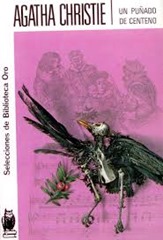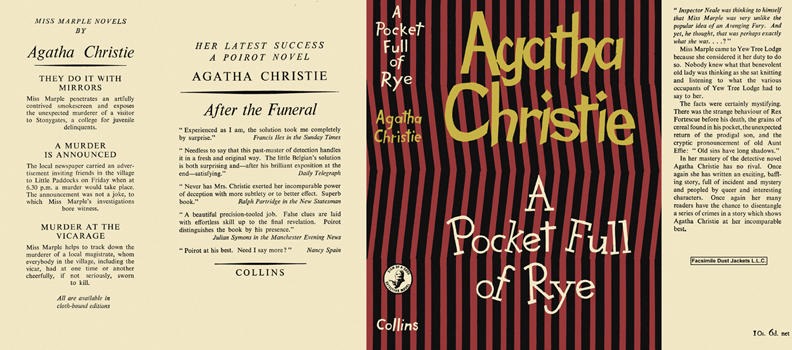Esta entrada es bilingüe, desplazarse hacia abajo para ver la versión en castellano
HarperCollins Masterpiece Ed, 2010. Format: Kindle Edition. File Size: 691 KB. Print Length: 257 pages. ASIN: B004APA52Y. eISBN: 978-0-0074-2270-8. First published in Great Britain by Collins, The Crime Club 1953, and in the US by Dodd, Mead & Co. the following year. The novel features her fictional amateur detective, Miss Marple. The novel was first serialised, heavily abridged, in the UK in the Daily Express starting on Monday 28 September, running for fourteen instalments until Tuesday 13 October 1953. Like several of Christie’s novels (e.g., Hickory Dickory Dock and One, Two, Buckle My Shoe) the title and substantial parts of the plot reference a nursery rhyme, in this case Sing a Song of Sixpence.
 Synopsis: A series of murders disguised within a nursery rhyme, Miss Marple’s on the case with two of Agatha Christie’s favourite themes, this time following the rhyme ‘Sing a Song of Sixpence’. A handful of grain is found in the pocket of a murdered businessman… Rex Fortescue, king of a financial empire, was sipping tea in his ‘counting house’ when he suffered an agonising and sudden death. On later inspection, the pockets of the deceased were found to contain traces of cereals. Yet, it was the incident in the parlour which confirmed Jane Marple’s suspicion that here she was looking at a case of crime by rhyme…
Synopsis: A series of murders disguised within a nursery rhyme, Miss Marple’s on the case with two of Agatha Christie’s favourite themes, this time following the rhyme ‘Sing a Song of Sixpence’. A handful of grain is found in the pocket of a murdered businessman… Rex Fortescue, king of a financial empire, was sipping tea in his ‘counting house’ when he suffered an agonising and sudden death. On later inspection, the pockets of the deceased were found to contain traces of cereals. Yet, it was the incident in the parlour which confirmed Jane Marple’s suspicion that here she was looking at a case of crime by rhyme…
More about this story: Published as a novel for Christmas 1953, it was well received by critics and public alike who had long been accustomed to looking forward to a good read for the festive season. The first adaptation was for film in Russia in 1983, titled Tayna chyornykh drozdov (The Secret of the Blackbirds). It starred Estonian Ita Ever as Miss Marple and remained set in England. Two years later the story appeared on UK television as part of the BBC’s Miss Marple series starring Joan Hickson, and was broadcast in two parts. It was then adapted for radio in 2005 by BBC Radio 4 with June Whitfield as Miss Marple.
My Take: Rex Fortescue, a wealthy businessman, feels suddenly seriously ill after sipping a cup of tea at his office in Consolidated Investments Trust. Once taken to a hospital, he passes away. When the police search the contents of his pockets, they find a small amount of what seems to be grain, rye to be more precise, but they can’t find an explanation to this. Inspector Neele attempts to contact the family, once it is suspected he has been poisoned. In fact, the autopsy discloses he was poisoned by taxine, a toxic alkaloid found in the yew tree, a tree abundant in the area around Fortescue’s residence at Yewtree Lodge. This alkaloid takes some time to come into effect and, therefore, he must have ingested it at breakfast. His wife, some thirty years his junior, becomes the main suspect, but the next day she appears dead. She has been poisoned with cyanide while she was having pastries with her tea. Shortly after, the maid Gladys Martin is found strangled in the yard, with a clothes peg on her nose. Inspector Neele doesn’t find any sense to what has happened but he is determined to get to the bottom of the matter. To this end he will count with the inestimable help of Miss Marple. In fact, it was her who taught Gladys Martin to serve and clean before entering to work with the Fortescues, and Miss Marple feels she owes her that.
A Pocket Full of Rye takes its title from a nursery rhyme which serves Christie, in a sense, as common thread of the story. We all know she has already used before nursery rhymes as titles for her novels, though probably we should not give a greater meaning to this detail. The story is set at the time when it was written and its theme is very reminiscent of the plot of another one of her novels, Hercule Poirot’s Christmas, published in 1938, about the return of the prodigal son. In any case I must confess I have enjoyed this book much more than I could imagine, and I do agree with Steve Barge aka Puzzle Doctor, when he states that this is probably ‘one of Christie’s most underrated tales’. The story is full of red herrings and has several turns and twists that will keep the reader trying to guess what is going to happen next. It is true that Miss Marple will only show up following the first third of the novel and that her intervention, essential for the clarification of the facts, doesn’t take a prominent role in this novel. But there’s really no reason for this to bother us at all. Ultimately it is a novel written with the skill and competence to which Agatha Christie has accustomed us to. Slightly below A Murder is Announced, which for me is, undoubtedly, her best Miss Marple, I won’t be surprised at all to find A Pocket Full of Rye ranked among the five top Marple novels. A highly entertaining read.
My rating: A (I loved it)
A pocket Full of Rye has been reviewed, among others, at Golden Age of Detection Wiki, In Search of the Classic Mystery Novel, Mysteries in Paradise, Crime Fiction Lover, Countdown John’s Christie Journal, and The Grandest Game in the World.
(Source: Facsimile Dust Jackets LLC. Collins The Crime Club (UK), 1953)
About the Author: Agatha Christie is the world’s best-known mystery writer. Her books have sold over a billion copies in the English language and another billion in 44 foreign languages. She is the most widely published author of all time in any language, outsold only by the Bible and Shakespeare. Her writing career spanned more than half a century, during which she wrote 80 novels and short story collections, as well as 14 plays, one of which, The Mousetrap, is the longest-running play in history. Two of the characters she created, the brilliant little Belgian Hercule Poirot and the irrepressible and relentless Miss Marple, went on to become world-famous detectives. Both have been widely dramatized in feature films and made-for-TV movies. Agatha Christie also wrote romantic novels under the pseudonym Mary Westmacott. As well, she wrote four non-fiction books including an autobiography and an entertaining account of the many expeditions she shared with her archaeologist husband, Sir Max Mallowan. Agatha Christie died in 1976. (Source: Fantastic Fiction)
Miss Marple series: The Murder at the Vicarage [1930], The Body in the Library [1942], The Moving Finger [1943], A Murder is Announced [1950], They Do it with Mirrors apa Murder With Mirrors [1952], A Pocket Full of Rye [1953], 4.50 from Paddington apa What Mrs. McGillicuddy Saw! [1957], The Mirror Crack’d from Side to Side [1962], A Caribbean Mystery [1964], At Bertram’s Hotel [1965], Nemesis [1971], Sleeping Murder [1976], and Miss Marple: The Complete Short Stories [1985].
Harper Collins UK publicity page
HarperCollins US publicity page
Home of Agatha Christie website
The official Agatha Christie website
Agatha Christie page at Golden Age of Detection Wiki
Un puñado de centeno, de Agatha Christie
 Sinopsis: Una serie de asesinatos enmascarados en una canción infantil, Miss Marple hace acto de presencia en el caso con dos de los temas favoritos de Agatha Christie, esta vez siguiendo la rima “Sing a Song of Sixpence”. Un puñado de grano es hallado en el bolsillo de un hombre de negocios asesinado … Rex Fortescue, rey de un imperio financiero, se encontraba tomando té contando su dinero cuando sufrió una muerte agonizante y repentina. En un exámen posterior, se encontró que los bolsillos del fallecido contenían restos de cereales. Sin embargo, fue el incidente en el salón lo que confirmó la sospecha de Jane Marple de que se encontraba ante un caso de crimen por rima …
Sinopsis: Una serie de asesinatos enmascarados en una canción infantil, Miss Marple hace acto de presencia en el caso con dos de los temas favoritos de Agatha Christie, esta vez siguiendo la rima “Sing a Song of Sixpence”. Un puñado de grano es hallado en el bolsillo de un hombre de negocios asesinado … Rex Fortescue, rey de un imperio financiero, se encontraba tomando té contando su dinero cuando sufrió una muerte agonizante y repentina. En un exámen posterior, se encontró que los bolsillos del fallecido contenían restos de cereales. Sin embargo, fue el incidente en el salón lo que confirmó la sospecha de Jane Marple de que se encontraba ante un caso de crimen por rima …
Más sobre esta historia: Publicada como la novela de las Navidades de 1953, fue bien recibida tanto por la crítica como por el público, que durante mucho tiempo estaba acostumbrado a esperar una buena lectura para la temporada festiva. La primera adaptación cinematográfica fue hecha en Rusia en 1983, titulada Tayna chyornykh drozdov (El secreto de los mirlos). Protagonizada por la estonia Ita Ever como Miss Marple y continuó ambientada en Inglaterra. Dos años más tarde, la historia apareció en la televisión británica como parte de la serie Miss Marple de la BBC protagonizada por Joan Hickson, y se emitió en dos partes. Luego fue adaptada para la radio en el 2005 por BBC Radio 4 con June Whitfield como Miss Marple.
Mi opinión: Rex Fortescue, un rico hombre de negocios, se siente repentinamente gravemente enfermo después de beber una taza de té en su oficina de Consolidated Investments Trust. Una vez llevado a un hospital, fallece. Cuando la policía registra el contenido de sus bolsillos, encuentran una pequeña cantidad de lo que parece ser grano, centeno para ser más precisos, pero no encuentran una explicación a esto. El inspector Neele intenta ponerse en contacto con la familia, una vez que se sospecha que ha sido envenenado. De hecho, la autopsia revela que fue envenenado por taxina, un alcaloide tóxico que se encuentra en el tejo, un árbol abundante en el área alrededor de la residencia de Fortescue en Yewtree Lodge. Este alcaloide tarda un tiempo en hacer efecto y, por tanto, debe haberlo ingerido en el desayuno. Su esposa, unos treinta años menor que él, se convierte en el principal sospechoso, pero al día siguiente aparece muerta. Ha sido envenenada con cianuro mientras tomaba pasteles con su té. Poco después, la criada Gladys Martin es encontrada estrangulada en el patio, con una pinza para la ropa en la nariz. El inspector Neele no encuentra ningún sentido a lo sucedido, pero está decidido a llegar al fondo del asunto. Para ello contará con la inestimable ayuda de Miss Marple. De hecho, fue ella quien le enseñó a Gladys Martin a servir y limpiar antes de entrar a trabajar con los Fortescues, y la señorita Marple siente que se lo debe.
Un puñado de centeno toma su título de una canción infantil que sirve a Christie, en cierto sentido, como hilo conductor de la historia. Todos sabemos que ya ha utilizado antes rimas infantiles como títulos de sus novelas, aunque probablemente no deberíamos darle un mayor significado a este detalle. La historia está ambientada en el momento en que fue escrita y su tema recuerda mucho a la trama de otra de sus novelas, Navidades trágicas, publicada en 1938, sobre el regreso del hijo pródigo. En cualquier caso, debo confesar que he disfrutado de este libro mucho más de lo que podía imaginar, y estoy de acuerdo con Steve Barge, alias Doctor Puzzle, cuando afirma que este es probablemente “uno de los cuentos más subestimados de Christie”. La historia está llena de pistas falsas y tiene varios giros y vueltas que mantendrán al lector tratando de adivinar qué va a pasar a continuación. Es cierto que Miss Marple solo aparecerá después del primer tercio de la novela y que su intervención, fundamental para el esclarecimiento de los hechos, no adquiere protagonismo en esta novela. Pero realmente no hay razón para que esto nos moleste en absoluto. En definitiva, es una novela escrita con la habilidad y competencia a la que Agatha Christie nos ha acostumbrado. Ligeramente por debajo de Se anuncia un asesinato, que para mí es, sin duda, su mejor Miss Marple, no me sorprenderá encontrar Un puñado de centeno entre las cinco mejores novelas de Marple. Una lectura muy entretenida.
Mi valoración: A (I loved it)
Sobre el autor: Nacida en Torquay en 1890, Agatha Christie recibió la típica educación victoriana impartida por institutrices en el hogar paterno. Tras la muerte de su padre, se trasladó a París, donde estudió piano y canto. Contrajo matrimonio en 1914 y tuvo una hija, pero su matrimonio terminó en divorcio en 1928. Dos años después, durante un viaje por Oriente Medio conoció al arqueólogo Max Mallowan, con quien se casó ese mismo año; a partir de entonces pasó varios meses al año en Siria e Irak, escenario de Ven y dime cómo vives (Andanzas 50, ahora también en la colección Fábula) y de alguna de sus novelas policiacas, como Asesinato en Mesopotamia o Intriga en Bagdad. Además del gran éxito de que disfrutaron sus célebres novelas, a partir de 1953 ganó celebridad con las adaptaciones teatrales de sus novelas en el West End londinense. En 1971 le fue concedida la distinción de Dame of the British Empire. Murió en 1976. (Fuente: Planeta de Libros).
Serie señorita Marple: Muerte en la vicaría (The Murder at the Vicarage, 1930); Un cadáver en la biblioteca (The Body in the Library, 1942); El caso de los anónimos (The Moving Finger, 1943); Se anuncia un asesinato (A Murder is Announced, 1950); El truco de los espejos (They Do It with Mirrors, or Murder With Mirrors, 1952); Un puñado de centeno (A Pocket Full of Rye, 1953); El tren de las 4:50 (4.50 from Paddington, or What Mrs. McGillicuddy Saw!, 1957); The Mirror Crack’d from Side to Side, 1962; Misterio en el caribe (A Caribbean Mystery, 1964); At Bertram’s Hotel, 1965; Nemesis, 1971; Sleeping Murder, 1976; y Miss Marple: The Complete Short Stories, 1985.

